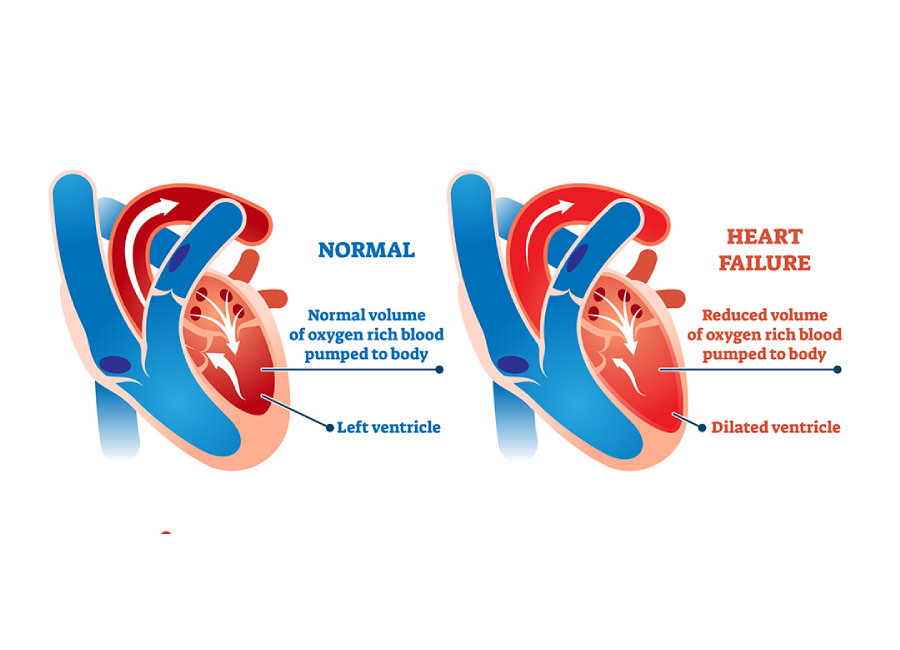Understanding Right-Sided Heart Failure
In the intricate symphony of the human body, the heart plays a central role as its maestro, orchestrating the circulation of life. While it’s often celebrated for its ceaseless rhythm, sometimes, it falters. One such discordant note in this symphony is “Right-Sided Heart Failure.”
This article aims to provide a comprehensive understanding of this condition, shedding light on its causes, symptoms, diagnosis, and treatment options. Whether you’re a healthcare professional seeking insights or an individual grappling with the challenges of right-sided heart failure, this article is your guide to navigating this complex terrain.

Anatomy of the Heart
To comprehend right-sided heart failure, we must first acquaint ourselves with the heart’s anatomy. The heart is a muscular organ situated slightly left of the chest’s center. It’s divided into four chambers: two atria (upper chambers) and two ventricles (lower chambers).
The right atrium receives deoxygenated blood from the body’s tissues and pumps it into the right ventricle. From there, the right ventricle propels this blood into the pulmonary artery, leading to the lungs. In the lungs, blood picks up oxygen and returns to the heart’s left atrium. Finally, the oxygen-rich blood is pumped into the left ventricle, which sends it out to nourish the body’s organs and tissues.
What is Right-Sided Heart Failure?
Right-sided heart failure, often abbreviated as RSHF, is a condition characterized by the heart’s inability to effectively pump blood received from the body to the lungs for oxygenation. This condition primarily affects the right ventricle, one of the heart’s lower chambers responsible for pumping deoxygenated blood to the lungs.
Causes and Factors Leading to RSHF
Understanding the causes of right-sided heart failure is crucial for early detection and management. While various factors can contribute to RSHF, the following are some of the primary causes:
Left Sided Heart Failure:
RSHF often develops as a consequence of left-sided heart failure. When the left ventricle fails to efficiently pump oxygenated blood into the systemic circulation, it leads to a backlog of blood in the pulmonary circulation, straining the right ventricle.
Pulmonary Hypertension:
High blood pressure in the pulmonary arteries can force the right ventricle to work harder to pump blood into the lungs. Over time, this increased workload can weaken the right ventricle.
Chronic Lung Diseases:
Conditions like chronic obstructive pulmonary disease (COPD) can negatively impact lung function, leading to elevated pressure in the pulmonary arteries and right-sided heart failure.
Recognizing the Signs and Symptoms
Identifying RSHF Symptoms
Recognizing the signs and symptoms of right-sided heart failure is pivotal for prompt diagnosis and intervention. While these symptoms may manifest gradually, they should not be overlooked. Common signs of right-sided heart failure include:
Peripheral Edema:
Swelling in the legs, ankles, and feet is a hallmark of RSHF. This occurs due to the accumulation of fluid in the body’s tissues, a result of impaired blood circulation.
Ascites:
In more severe cases, fluid buildup can extend to the abdominal cavity, leading to abdominal distension and discomfort.
Enlarged Liver:
A congested liver can cause hepatomegaly (enlarged liver), often accompanied by tenderness in the upper right abdomen.
When to Seek Medical Attention
Experiencing any of these symptoms warrants a consultation with a healthcare professional. Early diagnosis and intervention can significantly improve outcomes and quality of life for individuals with RSHF.
Diagnostic Evaluation
To confirm right-sided heart failure, healthcare providers may employ various diagnostic tests, including:
Echocardiography:
This ultrasound-based test provides detailed images of the heart’s structure and function.
Chest X-ray:
X-rays can reveal fluid buildup in the lungs and other cardiac abnormalities.
Electrocardiogram (ECG or EKG):
An ECG records the heart’s electrical activity, identifying irregularities.
Blood Tests:
Blood samples can help assess kidney and liver function and identify markers of heart failure.
Cardiac Catheterization:
In some cases, a catheterization procedure may be necessary to measure pressure within the heart’s chambers and assess blood flow.
FAQS:
1. What is right-sided heart failure (RSHF)?
Right-sided heart failure, or RSHF, occurs when the right side of the heart cannot efficiently pump blood into the pulmonary circulation, leading to various symptoms and health issues.
2. What are the common causes of right-sided heart failure?
Common causes of RSHF include left-sided heart failure, pulmonary hypertension, chronic lung diseases, and heart valve diseases.
3. What are the symptoms of right-sided heart failure?
Symptoms of RSHF include peripheral edema, ascites, enlarged liver, shortness of breath, fatigue, weight gain, and jugular venous distention.
4. How is right-sided heart failure diagnosed?
RSHF is diagnosed through tests such as echocardiography, chest X-rays, electrocardiograms (ECG), blood tests, and cardiac catheterization.
5. Can right-sided heart failure be cured?
While there is no cure for RSHF, it can be managed effectively through lifestyle changes, medications, and, in severe cases, surgical interventions.
6. What lifestyle changes can help manage right-sided heart failure?
Lifestyle changes include following a heart-healthy diet, managing fluid intake, regular exercise (as advised by a healthcare provider), and avoiding smoking and excessive alcohol.
7. Are there medications available for treating right-sided heart failure?
Medications such as diuretics, ACE inhibitors, beta-blockers, and vasodilators may be prescribed to manage RSHF and improve heart function.
8. When is surgery considered for right-sided heart failure?
Surgery, such as heart valve repair/replacement or heart transplant, may be considered in severe cases where other treatments are ineffective.
9. Can right-sided heart failure be prevented?
Prevention involves managing risk factors like high blood pressure, diabetes, and heart disease, and seeking prompt treatment for conditions that can lead to RSHF.
10. What is the prognosis for individuals with right-sided heart failure?
The prognosis varies depending on the underlying cause, the severity of RSHF, and how well it responds to treatment. Early diagnosis and management can improve outcomes.
Conclusion:
In this first part of our exploration of right-sided heart failure, we’ve defined the condition, outlined its primary causes, and highlighted the critical importance of recognizing its symptoms. In the next section, we will delve deeper into the diagnostic process and treatment options for individuals living with RSHF.




